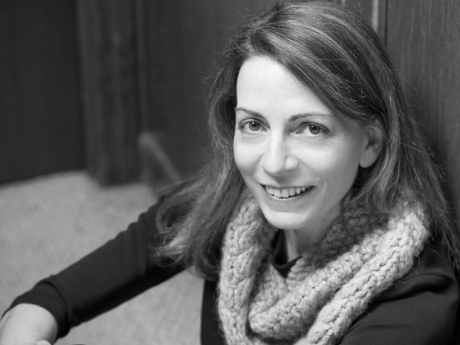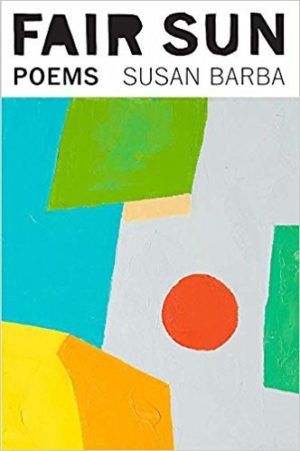In Their Own Words
Susan Barba on “Andranik”

"Andranik" (an excerpt)
Papa, what happened before the burning barn? What happened when you were at your house? Did your father come back to find you?
Oh, my father. Well, you know. When they start killing, my father that night came. That night came. And see we were all gathered in the big house. In our house. They had seen there, is empty. So he came. Talked to me. He say, I take you. We go to Honey River side. Hide us in the bush. So. He took me. I have a dog. And the dog followed us. And just edge the river. River. Is thick. Some kind of bamboo. Hide ourself there. My father and me. So. After the gendarmerie on horseback. They. Hundreds run all around. Find to kill. To rob. They come close to us where my father and me hiding and our dog with us. When gendarmerie come our dog bark, run after the horses. Oh gendarmerie find this hiding thing. They come.
They took your father then?
They caught my father.
What did they do to your father?
I throw. I throw myself.
What did they do to your father, Papa?
They killed.
Right there? In front of you?
My father only have a dagger. He didn't have a gun. They caught my father. My father was a big man, over six feet, a strong man. And three, four Kurds, dagger and gun. They didn't shoot. They say the bullet is worth more than the man. So my father tried to get the Turkish, Kurdish gun. But one Kurd hit my father right here. And my father whispering throw yourself in the water. I throw myself in the water. I was a very good swimmer because every day summer I used to swim the deep. So I swim far away. And the Kurds they took my father's clothing. Nothing left on. And they gone.
...
See, there were cruel things that Turks had organized. Have happened when I had given up myself winter to that Kurdish house. They need me because I take care, sweeping. Oh, so hard work for me. But I have enough to eat.
And, and have happened that house I were in one Kurdish. Kurdish, you know, mullah, preacher. Had come to that house. That house where I was, was chief's house. They make him shish-kebab, things. Eat and wash beard, hands, and so on. After eating so well, he say, "You know, any house I go to eat and make nahmas – wash myself – if that house there is gavoor – unbeliever, the Christians are gavoor, infidels – that's haram. It is not clean for me if I eat there. So got to be killed. Killed."
So, my agha took my ear, brought me to him. "This I've got at my house." So others they brought others. About a dozen like myself age boys. One, my playmate. We had been together when we were crawling and studying. Torkom name. Torkom.
And have happened that Torkom's mother when pregnant to give birth, my mother be pregnant unfortunately to give birth to me. And they summertime, the women come. Sit. Throw mats. Sit and tell stories. And Torkom's mother and my mother said, "Kouyrig," they are pregnant, they say, "If one be a boy, one be a girl, they marry together." See they make. Unfortunately my mother gives birth to me and Torkom's mother gives boy. And we grow together.
Like brothers. Yes, all the time together.
Day and night. Summer outside we sleep on mats. Moon. Stars. And daytime go swim and chase ducks.
So happened that after months when I escaped from the burning barn and went to the mountains they brought him. After it was winter.
And what happened?
I killed Torkom.
How?
They, you know, the mullah when he eat shish-kebab, everything. They say. So. They want to make fun. Play. They put two guns to the wall. In one gun, live bullet. In one gun, no bullet. No live bullet. Like me and Torkom there. Guns into wall. They say, "Go get a gun." I went. Torkom. We went together. I lift a gun. Torkom lift a gun. See. I didn't know if the gun there is a live bullet or no. Torkom didn't know. So. About twelve feet far from each other. And. And ordered, shoot. I shoot and killed Torkom. My gun have live bullet. I killed him.
So. They. They make enjoy.
See.
That's a cruel human being.
From Fair Sun (Godine, 2017). All rights reserved. Reprinted with the permission of the author.
On "Andranik"
The most accurate definition of a poem that I have ever heard is Theodor Adorno's: "a philosophical sundial telling the time of history." Employing a simile to describe what is difficult to articulate literally, Adorno captures the figurative nature of poetry, how lyric poems describe social reality through symbolic figuration. So when we read a poem, we are reading the time of its history, which the poem adds to by its own presence in the world. Most of the poems in my book Fair Sun are lyric poems that function through symbolic figuration of this kind. The one exception is the long narrative poem "Andranik," which comprises the entire second section of the book.
As a poet, I have rarely felt compelled to tell a story. Poems arise instead from fragment, silence, image, sound. "Andranik" is an exception. Here I tried to avoid finding symbolic equivalents, metaphors, for the recording of history. It was the transcription of reality itself that seemed necessary to this story. This was the only story I've ever felt compelled to tell, the story I grew up hearing throughout my childhood, the story of my grandfather's survival of the Armenian Genocide. He was a boy living in the eastern province of Muş, in the Ottoman Empire, when the mass killings began in 1915; he was the only member of his family to survive the genocide. "Andranik" is a narrative poem based on his testimony.
The testimony was from material gathered during interviews with my grandfather over many years. In terms of shaping the poem, parceling it out into stanzas and pages, I proceeded in the dark, solely by feel. It was crucial to get his voice right, to not aestheticize the telling. I was influenced by the Armenian poet Eghishe Charents's "Mahvan Desil" (Vision of Death) and Peter Balakian's "History of Armenia" with its vision of East Orange, NJ, burning. But superb as they are, these are figurative poems, and "Andranik" has more in common with a poem like Charles Reznikoff's book-length Holocaust, based on the Nuremberg war tribunal and Eichmann trial. His poem is history itself transcribed and severely edited, a timepiece more detailed than a sundial, more like a seismograph, registering every shock in real time. It was this direct telling of the time of history I had in mind for "Andranik."



